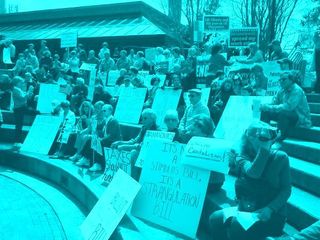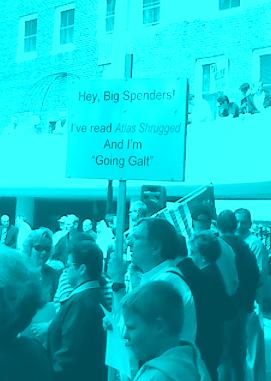While I could only stay for the first hour or so of the 3 hour "protest", I can report the following:
First of all, I take bad pictures, made even worse by the fact that I used a cell phone camera which was set to black/white (which actually seems to be blue/white). I'll pepper the most legible photos here. [UPDATE: BlueNC was there and took better photos].
 The turnout was quite good. I would estimate about 800. Very few minorities (natch). Mostly the elderly (men and woman). The middle age was mostly women (to my surprise). And there were comparatively few under 30. There were a few families, and little girls were forced to carry signs that they didn't understand.
The turnout was quite good. I would estimate about 800. Very few minorities (natch). Mostly the elderly (men and woman). The middle age was mostly women (to my surprise). And there were comparatively few under 30. There were a few families, and little girls were forced to carry signs that they didn't understand.
What exactly were they protesting?
Well, was like I posted a couple of days ago: it was basically "whatever you got", to paraphrase Jimmy Dean.
Going from the (handmade, yard-sale quality) signs, one clear thrust of the protest dealt with taxes, even though the Obama administration is cutting taxes for all except the very richest of Americans. Even then, the message wasn't clear.
 A few signs said "No Taxes", but these were mostly held by kids (and presumably made by them as well). Most of the tax-related signage didn't go that far, but contained messages like "Taxed Enough Already" (the first letters forming "TEA") or "I already pay enough taxes". Apparently these people were protesting future tax increases.
A few signs said "No Taxes", but these were mostly held by kids (and presumably made by them as well). Most of the tax-related signage didn't go that far, but contained messages like "Taxed Enough Already" (the first letters forming "TEA") or "I already pay enough taxes". Apparently these people were protesting future tax increases.
One sign read "10% of the people pay 72% of the income taxes!! Is that fair??" I'm not sure what the signholder's intention was. The wealthiest 10% of Americans do pay the lion's share of income taxes — but that's because they receive the lion's share of income. That does strike me as fair. I would rather have the wealthiest 10% of income-earners pay 72% of the taxes rather than try to squeeze it out of the poorest 10% (or even the middle 10%), wouldn't you?
I didn't ask this sign carrier what he meant. It's probably not a good idea to, as this CNN reporter found out today:
[It's interesting for the teabagger in the above clip to invoke Lincoln in his anti-tax screed. Anyone want to guess the president who first mandated income taxes? Bueller? Bueller? And by the way, FOX aired this clip, cutting out the guy with the Obama-Hitler poster]
Of course, I'm trying to find logic where perhaps none exists. As publius writes:
The tea parties, however, don’t have much to do with logic. I’m sure our modern-day Samuel Adamses aren’t supporting big military spending cuts. I doubt they care that taxes are unchanged or lowered on 95% of families. I suspect they had almost nothing to say about the spending and executive overreach of the Bush years. Logical consistency, remember, isn’t the point.
The point is that tea parties give them an opportunity to reaffirm their own ideological self-image. In their own heads, they want to be “small government” people. In this sense, the tea parties are simply atonement – trying to “out out” the damned spot.
Still, as I said, it was clear that the tea party protests are loosely about taxes. [RELATED: 48% of Americans think they pay just the right amount in taxes]
The other clear thrust of the protest dealt with the other end of the economic equation: government spending. Here, the message was even more disjointed. Many people objected, for example (again, going by the signs) to the bailouts. Others, to government "pork". And still others, to the stimulus. Many of the signs expressed concern about the deficit.
 I personally don't have a problem with people expressing concerns about the government running up deficits. It should be a concern. But I was left to wonder where these people were when Bush was turning the huge surplus that Clinton gave him into a massive trillion dollar deficit.
I personally don't have a problem with people expressing concerns about the government running up deficits. It should be a concern. But I was left to wonder where these people were when Bush was turning the huge surplus that Clinton gave him into a massive trillion dollar deficit.
One could argue, "well, Bush had to spend the massive amounts of money — we were attacked and that led to us fighting wars in Iraq and Afghanistan". Fair point, but we're still fighting those wars. And more importantly, what is the reasoning which leads one to condone deficit-spending in order to rebuild Iraq's infrastructure, but get upset about deficit-spending to rebuild our own infrastructure to combat an economic crisis?
But I digress.
Once the speakers took the stage, it got more interesting (for me). It was quite clear that their goal was to channel this mass discontent into pleas to join their organization, their think tank, their whatever.
The first speaker, an organizer from ncteaparty.com was refreshingly candid. He acknowledged that he knew diddly-squat about organizing protests, and suspected that most of the people there had never been to a protest.
The second speaker was a woman from the John Locke Foundation, and it was clear to me that she was either (1) stupid or (2) catering to the naivety of the crowd. It was remarkable. She said she was going to talk about "freedom". And then she proceeded to talk about excessive government spending.
 It was never made clear to me what excessive government spending has to do with "freedom". I mean, here were hundreds of people exercising their freedom to assemble, their freedom to protest, etc. Even I, an opponent of everything said there, was moved by the "vox populi"ness of the tea party protest. I LOVE it when the people speak, even if I don't agree with them.
It was never made clear to me what excessive government spending has to do with "freedom". I mean, here were hundreds of people exercising their freedom to assemble, their freedom to protest, etc. Even I, an opponent of everything said there, was moved by the "vox populi"ness of the tea party protest. I LOVE it when the people speak, even if I don't agree with them.
I apparently was the only one struck by the irony that these people were free to protest, and yet they had these speakers and signs that somehow suggested that the policies of the Obama government were infringing on freedoms. What freedoms they never said.
But every time this particular speaker used a phrase with the word "freedom" in it, people applauded. When she failed to use that buzzword (or other patriotic buzzwords), people sat on their hands. It was clear to me that many people in this crowd weren't really listening to, or not understanding, what was said so much as they were looking for an auditory cue to wave their flags (literally in some cases).
This same woman also talked about responsibility. She took on, for example, the car industry. They had the responsibility of running their own businesses. They could have, she said, not hired union workers. But they did. Now those auto manufacturers have to take responsibility for their actions, and not rely on government bailouts.
It was a cogent argument (one which I won't refute here), but as I listened to her, I wondered how her anti-union message would have been received at a tea party in Detroit or Flint.
This woman, as I said, was from the John Locke Foundation. She touted their alternative budget as being better than then the one presented by the NC legislature, which (she said) was full of tax increases and wasteful government spending.
She railed in particular against the NC government spending so much money on "social programs" (adding that such exhuberant spending limits "your freedom" although, again, I don't know what one has to do with the other).
I took a gander at the John Locke alternative budget to the one passed by the NC lesiglature. As expected, it lowers taxes drastically, and cuts government spending to "social programs", just as the speaker said it would. But at the rally, the speaker didn't bother to mention what some of these "social programs" were. I will:
- Cultural programs ($26,509,810 less) — NC Arts Council, for example, gets over $8 million less
- Blind and Deaf/Hard of Hearing Services ($1,247,231 less)
- Public Health ($20,565,091 less) — includes $2,000,000 less for HIV prevention, $329,000 less for public health testing (includes elimination of jobs there), $2,000,000 less for the Breast and Cervical cancer program, elimination of UNC's OASIS program, etc.
- Vocational rehabilitation programs ($3,591,938 less) — including merging the entire disability administration with the Blind and Deaf Services (which was gutted — see above)
- Crime Control and Public Safety ($4,468,222 less) — including Flood Map planning, National Guard and rape assistance programs
- Agriculture services ($23,160,175 less [more than half of that area's budget]) — including pesticide control, food testing
- Clean Water Management Trust Fund (elimination in its entirety — all $100,000,000): John Locke Foundation would let industries self-police
- Miscellaneous: Cut DMV Driver's License Division by $4.7 million by merging DMV offices (because they're not crowded enough)
The list goes on and on and on.
And then, this same woman, griped that the North Carolina government cut spending on transportation and prisons too much.
Now, why does government budget spending increases in any of the above programs "take away your freedoms", but a failure to increase spending in transportation/prison as high as John Locke's budget also "take away your freedoms"? This apparently was lost on the audience. But they booed and cheered appropriately, as long as whatever was said was being couched in jingoistic nationalistic terms (like "freedom").
By the way, I'm not saying that limiting government spending is bad. Some things are worth spending money on; others, maybe not so much. The point is: it's entirely subjective. I'm just saying that if she had bothered to provide a complete list of these eeeeevil social programs to the flag-waving audience, I have no doubt that most of them would have said (at some point): "Wait a second. That's a good program."
But to rail against ALL taxes as oppressive, or ALL government spending as "wasteful", is just plain oversimplified to the point of silliness.
And that brings me to MY main point.
These protesters were not stupid or evil. They just hadn't thought things through.
It's easy to be against "wasteful government spending" when you're never called upon to even think about what is supposedly "wasteful".
[UPDATE: Andrew Sullivan picks up on this point as well:Protesting government spending is meaningless unless you say what you'd cut.
If you favor no bailouts, then say so. If you want to see the banking system collapse, then say so. If you think the recession demands no fiscal stimulus, then say so. If you favor big cuts in Medicare, Medicaid, social security and defense, then say so. I keep waiting for [tea party promotor Glenn] Reynolds to tell us what these protests are for; and he can only spin what they they are against.
All protests against spending that do not tell us how to reduce it are fatuous pieces of theater, not constructive acts of politics. And until the right is able to make a constructive and specific argument about how they intend to reduce spending and debt and borrowing, they deserve to be dismissed as performance artists in a desperate search for coherence in an age that has left them bewilderingly behind.]
It's easy to be against high taxes, if your brain isn't allowed to consider what that tax money will be spent on. It kind of reminded me of the rabble in this Simpsons episode, where the townspeople couldn't simply grasp the connection between taxes and social services:
The most striking thing about the whole protest was the constant reference to the government as "they". Apparently, the tea bag segment of the population loves America, but hates the American government. They love the Founding Fathers, but hate the government that the founding fathers formed. They profess to love the Constitution, but they hate the government created by that document. And I'm not talking about the "Obama government" — these people generally hate government as a concept. (They only complain about it, however, when a Democrat is at its head.)
The second speaker that I listened to was from the Civitas Institute. He again fired the masses by going for those jingoistic phrases. He was big on the symbolism of "Don't Tread On Me". The Civitas Institute had 7 or 8 Gadsden flags throughout the plaza, all bearing the iconic snake and bearing the words "Don't Tread On Me".
I won't get into this speaker too much, except to say that he was either stupid, or playing on the naivety of the crowd he was addressing. At one point, for example, he said this:
"…And whatever happened to the free market? I mean, these bailouts? Let me ask you: What would have happened if AIG had gone bankrupt? I'll tell you what: it would have gone bankrupt. But nooooo, we had to save it. It was 'too big to fail'." [boos, cheers, etc.]
This is just plain wrong, and there's not an economist — on the left or right — who would agree with this speaker's assessment of the AIG bailout. Look, AIG insures banks. Big banks. Big banks who made bad investments, and took out insurance on those bad investments. If AIG had failed, then those banks would be unable to collect that insurance, and THEY would have failed. And then other banks would freeze up, and there would have been no flow or credit to businesses large and small. Companies would fold, and the unemployment rate would be twice what it is now.
So the point of bailing out AIG wasn't to save AIG, its golden-parachuting senior management, or even its employees. The point was, ultimately, to save Main Street, and us. And anyone who doesn't recognize that shouldn't get in front of a microphone to talk about it. (That said, one can legitimately complain about the amount of the AIG bailout, or certainly the terms tied to the bailout, or any number of related issues. But to complain the necessity of it? Moronic.)
As I left the tea party to return to work (much to my sadness, because nationally-syndicated columnist and K'vegas resident Nathan Tabor was due to speak), the Civitas speaker was going on about government "takings", a legal reference to property. The Constitution does not allow the government to "take" your property without "just compensation". To this guy, that meant that the government cannot regulate your property, which, of course, is an entirely different thing.
The example he used was an "intermittent stream", which is a stream that forms when it rains a lot. North Carolina land use laws do not permit building on an areas that have intermittent streams — where there is a stream during the rainy season. Yes, that was his outrage, and he went on about it, invoking the flag, and freedom, and Thomas Paine.
Again, the audience sat on its hands (seriously, he's talking about streams???) until he said a sentence that included the word "freedom" or "God" or "America". Then, applause.
He then turned to the example of toilets, saying that because the government has so many regulations regarding toilets, the third-largest thing being smuggled in from Mexico (after drugs and people) is toilets. I don't know if that Mexico "fact" is true or not, but his point was that toilet smuggling is a consequence of "needless" government regulation. And the audience cheered. What he didn't the audience was that in the 1990's, the federal government essentially banned high-flow toilets because they wasted water. That creates a problem, especially in times of drought. Now, had he mentioned that to the crowd, I'm sure there would have been a handful of tobacco farmers who get hit hard whenever there is a drought or water shortage. And their take on that "needless" government regulation would have been quite different.
Again, that was my point. The people had legitimate concerns, but in the end, they hadn't thought things through.
Anyway, the toilet hissy-fit was my cue to leave.
I'll leave the coda to This Modern World's Greg Saunders:
In the grand scheme of things, getting people to complain about taxes on April 15th might be the easiest thing in the world. It’s right up there with “eating ice cream on a hot summer day” and “laughing whenever Glenn Beck cries”. Bitching about taxes is America’s true pastime. So when a few thousand people gather on tax day to whine about their taxes (after getting massive tax breaks, btw), it’s hardly the second coming of the American Revolution. Hell, I remember a time six years ago when millions of people took to the street to protest the government. We all saw how well that worked out.
When their rallying cry is “Grrrr…I hate you TAXES!”, there won’t be a whole lot left to keep the tea bagging movement together after April 15th. Manufactured-populism and a fractured-understanding of American history will only take you so far. The great-great-great-great grandchildren of liberty will have to find some other crusade to motivate them like birth certificate forgeries or investigating whether Bo Obama was really a rescue dog. Sure, some die-hards will stick around like the asshole who keeps flipping through your DVD’s at three in the morning oblivious to the fact that the party is over, but within a few weeks, the only people left to carry the “tea party” torch will be the GOP & Fox News personalities trying to recapture the “good times” with all the subtlety and humility of Chubby Checker trying to get everyone to do the twist.
I’m going to miss the “Tea Party” movement. I’m going to miss the powdered wigs and the lunatic ranting. I’m going to miss the ideological uncertainty and the unpragmatic futility (seriously, you’re mailing tea bags to the White House to demand lower taxes after you just got a tax cut?). Most of all, I’m going to miss the jokes. These last few weeks have been a golden age for juvenile humor that passes for insightful political commentary. It’s a rare movement that chooses to describe itself with terminology that also means “testicle slapping” and those of us who relish in the foolishness of conservative activism will be much worse off for it.
